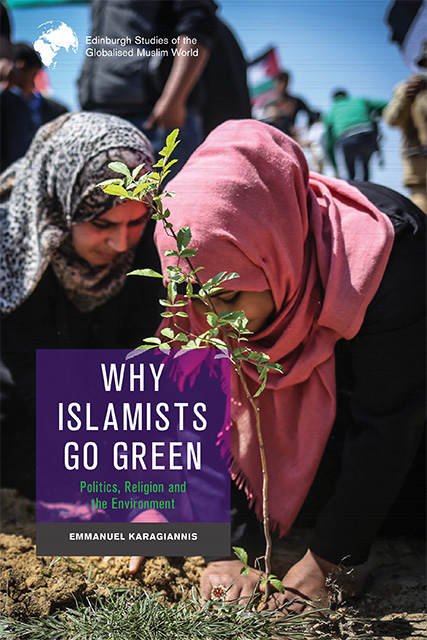Book contents
- Frontmatter
- Contents
- Glossary
- Transliteration
- Series Editor’s Foreword
- Preface and Acknowledgements
- Dedication
- Introduction
- 1 Islam and the Environment
- 2 The Muslim Brotherhood and the Environment
- 3 Hizb ut-Tahrir and the Environment
- 4 Hizbullah and the Environment
- 5 Hamas and the Environment
- 6 The Jihadi-Salafi Movement and the Environment
- 7 Understanding Islamist Environmentalism
- Conclusions
- Appendix
- Select Bibliography
- Index
1 - Islam and the Environment
Published online by Cambridge University Press: 20 October 2023
- Frontmatter
- Contents
- Glossary
- Transliteration
- Series Editor’s Foreword
- Preface and Acknowledgements
- Dedication
- Introduction
- 1 Islam and the Environment
- 2 The Muslim Brotherhood and the Environment
- 3 Hizb ut-Tahrir and the Environment
- 4 Hizbullah and the Environment
- 5 Hamas and the Environment
- 6 The Jihadi-Salafi Movement and the Environment
- 7 Understanding Islamist Environmentalism
- Conclusions
- Appendix
- Select Bibliography
- Index
Summary
Islam was founded in a region with harsh climatic conditions and scarce resources. As a result, the Muslim faith is oriented towards conservation and protection of the environment. Like the rest of the planet, the Muslim world has greatly suffered from many environmental problems due to massive urbanisation, rapid economic growth and overexploitation of natural resources.
This chapter aims at providing an overview of the relationship between Islam and the environment (al-biʾa). It examines Islamic eco-theology as a distinct sub-category of theology dictating environmental ethics. It covers four distinct and interrelated thematic areas: land and water, trees, animals, and pollution and energy. The selection of these thematic areas is based on the availability of information, as well as their practical significance for the well-being of Muslim communities. While the list of topics is not exhaustive, the goal is to demonstrate how the Muslim faith views the relationship between humanity and nature.
Moreover, the chapter describes the role of Shariʿa in environmental matters, including the use of land, water management and animal rights. The increased environmental awareness has also compelled religious leaders to offer relevant fatwas.
The Content and Context of Islamic Eco-theology
Eco-theology is a sub-category of theology that examines the connection between religion and nature. The term ‘Islamic eco-theology’ refers to the study of Muslim creed (aqida) in relation to environmental issues. It also focuses on the essence of religious ideas about man’s relationship with nature. Islam was not established in isolation from other religions, however. In fact, it came to integrate pre-Islamic norms, values and beliefs. The Muslim faith was certainly influenced by the religions that existed in the Middle East before the seventh century. For many centuries, the inhabitants of the Arabian Peninsula were polytheists or followed Judaism and Christianity. Nevertheless, Islam has a unique understanding of the environment that is centred on theosophy (the nature of divinity), cosmology (the origin of the universe) and ontology (the nature of humanity).
Islam teaches that God has ninety-nine names or attributes. Among other things, He is the First (Al-Awwal) who existed before the creation and is the Last (Al-Akhir) after the end of the world. God is also the Creator (Al-Khaaliq) and the Giver of Life (Al-Muhyi).
- Type
- Chapter
- Information
- Why Islamists Go GreenPolitics, Religion and the Environment, pp. 18 - 45Publisher: Edinburgh University PressPrint publication year: 2023



